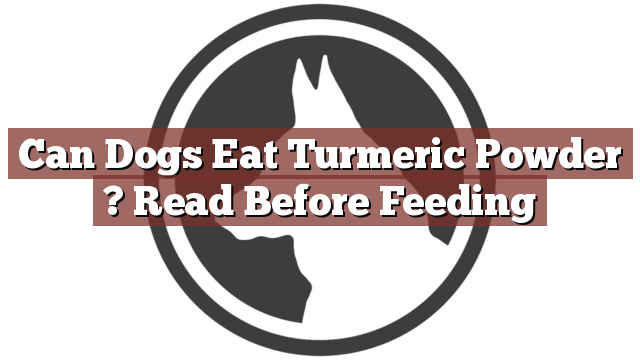Understanding Your Dog’s Dietary Needs
As pet owners, it is essential for us to understand our dog’s dietary needs in order to provide them with a healthy and balanced diet. Dogs are primarily carnivorous animals, which means their bodies are designed to process and digest meat. However, they can also benefit from certain plant-based foods that offer additional nutrients and health benefits. While some herbs and spices are safe for dogs to consume, it is crucial to be cautious and do thorough research before introducing any new food into their diet.
Can Dogs Eat Turmeric Powder? Read Before Feeding
Can dogs eat turmeric powder? Turmeric is a spice commonly used in cooking due to its vibrant color and potential health benefits. It contains an active compound called curcumin, which has antioxidant and anti-inflammatory properties. However, when it comes to feeding turmeric powder to dogs, it is important to exercise caution and consult with your veterinarian beforehand.
Pros and Cons of Feeding Turmeric Powder to Your Dog
Feeding turmeric powder to your dog may have some potential benefits. The active compound curcumin has been found to have anti-inflammatory properties, which may help with conditions such as arthritis or joint pain. It is also believed to have antioxidant properties that can support the immune system and promote overall health. Additionally, turmeric powder has been linked to potential benefits for dogs with digestive issues or skin problems.
However, it is important to consider the potential drawbacks as well. Turmeric powder can have a strong flavor and could cause an upset stomach or digestive issues in some dogs. It may also interact with certain medications, so it is crucial to consult with your veterinarian to ensure it is safe for your dog to consume. Furthermore, excessive amounts of turmeric powder can lead to digestive discomfort or even liver problems in some dogs.
Conclusion: Considerations for Feeding Turmeric Powder to Your Dog
In conclusion, dogs can eat turmeric powder, but it should be done in moderation and with caution. Before incorporating it into your dog’s diet, it is essential to consult with your veterinarian to determine the appropriate dosage and assess any potential risks or interactions with medications. While turmeric powder can offer certain health benefits for dogs, it is not a substitute for a well-balanced diet and should only be used as a supplement. Remember to prioritize your dog’s overall dietary needs and monitor their reaction to any new food or ingredient introduced into their diet.
Thank you for taking the time to read through our exploration of [page_title]. As every dog lover knows, our furry friends have unique dietary needs and responses, often varying from one canine to another. This is why it's paramount to approach any changes in their diet with caution and knowledge.
Before introducing any new treats or making alterations to your dog's diet based on our insights, it's crucial to consult with a veterinarian about [page_title]. Their expertise ensures that the choices you make are well-suited to your particular pet's health and well-being.
Even seemingly harmless foods can sometimes lead to allergic reactions or digestive issues, which is why monitoring your dog after introducing any new food item is essential.
The content provided here on [page_title] is crafted with care, thorough research, and a genuine love for dogs. Nevertheless, it serves as a general guideline and should not be considered a substitute for professional veterinary advice.
Always prioritize the expert insights of your veterinarian, and remember that the health and happiness of your furry companion come first.
May your journey with your pet continue to be filled with joy, love, and safe culinary adventures. Happy reading, and even happier snacking for your canine friend!

